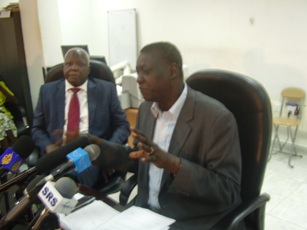Abyei community demands action against Sudan for blocking AU visit
October 26, 2013 (JUBA)- Leaders at a consultative meeting in the contested region of Abyei have expressed disappointment over a decision by the Sudanese government to block a visit by the African Union (AU) to the area, demanding that strong action be taken against the latter.

Luka Deng Biong, the spokesperson for Abyei high referendum committee said the people of Abyei were once again disappointed by the continental body’s failure to pay the expected visit.
It’s the third time the AU has postponed a visit to the oil-producing area, with scheduled meetings on 20 and 22 October also failing to take place.
“Now we are told that they have postponed it again because they have been denied by the government of Sudan. They said the government of Sudan has said it will not be responsible for their security and safety if they insist to visit Abyei. This is why they cancelled the visit and this indicates Sudan is planning something”, Deng told Sudan Tribune by phone from Abyei town on Friday.
He says the purpose of the visit was for the AU to see for itself the realities on the ground, as well as gather first-hand information about the dispute and the commitment of the Ngok Dinka in determining their fate.
Deng called for the United Nations Security Council (UNSC) and the AUPSC to take immediate action against the Sudanese government and endorse the conduct of a referendum as proposed by the AU High-Level Implementation panel (AUHIP), led by former South African president Thabo Mbeki.
“It is the time the council takes concrete action and endorses the African union proposal. Without real and sustained pressure from the council on the government of Sudan, it will be impossible to make progress and Sudan would be happy to continue buying time and wasting resources”, said Deng, adding that Sudan continued to ignore the decisions of international institutions on the matter.
“This is clear race against the time. Many years have passed since the United Nations Security Council adopted resolutions on Abyei – none of which has been implemented by the government of Sudan”, he said.
A referendum on Abyei was due to take place at the same time as the South Sudanese vote for independence in 2011, but was postponed due to disagreements over who was eligible to participate.
While Juba maintains that only the Ngok Dinka, as permanent residents of the area, be allowed to participate, while Khartoum insists that the nomadic Misseriya Arabs, who enter the area periodically to graze their cattle, should also be allowed to take part in the referendum to decide whether the area will join Sudan or South Sudan.
Last year, the AU mediation team backed South Sudan’s position, proposing to hold a referendum in Abyei this month in a bid to break the deadlock.
However, Sudan rejected the proposal, saying it ignored that the eligibility of the Misseriya and that a public administration and institutions must be established first before any vote can take place.
Abyei’s resident Ngok Dinka community openly declared their intention to conduct a referendum on 31 October after its members held a general conference in Abyei town last week.
Both the United States government and the UNSC have warned against unilateral action, saying the move could inflame tribal tensions in the already volatile area.
South Sudan this week also questioned the outcome of holding a referendum in the contested region when the result would not be recognised by either country.
NO IMMEDIATE SOLUTION
During last week’s meeting, Kiir and Bashir agreed only on the general terms for the administration and policing of Abyei, instead of an immediate solution to the impasse.
In a joint communique, the two leaders agreed “to expedite the establishment of Abyei administration, council and police organs, and reaffirm that the 2% share of [the] Abyei area’s oil revenue, including arrears, will be paid to the Abyei administration”.
Resolving the final status of Abyei remains a major issue between Sudan and South Sudan after the latter broke away from the former in July 2011, leaving several unresolved post-secession issues.
(ST)
